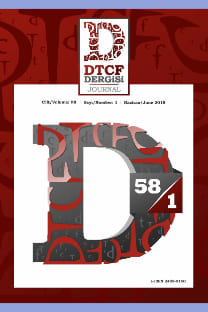WHEN MAGIC IS REPLACED WITH SCIENCE: SCIENCE 1POEMS OF DAVID MORLEY
In his seminal work, The Golden Bough (1890), Scottish anthropologist James Frazer argues that the phases of belief systems in different parts of the world can be divided into three. For him, the Age of Magic, is replaced by the Age of Religion which is then replaced by the Age of Science. Recent interests in contemporary British poetry confirm Frazer's prediction. Due to postmodernism, which sidelined mainstream attitudes in poetry, and the rising infiuence of science and technology on the society, science poetry came into being in the latter half of the twentieth century Britain with writers like Hugh MacDiarmid, Edwin Morgan, Robert Crawford, W. N. Herbert, Allen Fisher, Peter Redgrove, Lavinia Greenlaw and Pauline Stainer. Anglo-Romani poet David Morley is one of the pioneering figures of British science poetry. Morley's science poems aim to take science out of the laboratory into the public arena. Trained as a biologist, Morley in his poems underlines how interest in magic has been replaced by science in today's technological world and emphasises science's inseparability from contemporary experience. In addition to this, Morley employs the scientific method in writing a number of his poems, such as his fieldtrip poems, which rely on scientific observation and the acquisition of data. Thus, Morley's poems can be read as scientific experiments in terms of their methodology and the analogies they raise. For him, technoscientific discourse, progressively invading mankind's life, is not likely to disappear from the poetic arena, hence its presence is continuously acknowledged in his poems. In this light, this study will analyse British science poetry as represented in David Morley's poems, which besides underlining the replacement of magic by science, also shows the poet-scientist in action, while collecting data and creating a poem based upon his findings.
BİLİM SİHİRİN YERİNİ ALINCA: DAVID MORLEY'İN BİLİM ŞİİRLERİ
Ufuk açıcı The Golden Bough (1890) (“Altın Dal”) adlı eserinde, İskoç antropolojist James Frazer, dünyanın farklı yerlerindeki inanç sistemlerinin üç aşamaya ayrılabileceğini iddia eder. Frazer'a göre, Sihir Çağı, Din Çağı'yla, bu ise Bilim Çağı'yla yer değiştirmiştir. Çağdaş İngiliz şiirindeki yeni eğilimler Frazer'ın öngörüsünü destekler. David Morley İngiliz bilim şiirinin öncü isimlerinden biridir. Ana akım yaklaşımları şiirde kenara iten postmodernizm ile bilim ve teknolojinin toplum üzerinde giderek artan etkileri sonucu bilim şiiri, yirminci yüzyılın ikinci yarısında İngiltere'de Hugh MacDiarmid, Edwin Morgan, Robert Crawford, W. N. Herbert, Allen Fisher, Peter Redgrove, Lavinia Greenlaw ve Pauline Stainer gibi yazarlarla ortaya çıkmıştır. Anglo-Roman şair David Morley, İngiliz bilim şiirinin öncülerindendir. Morley'nin bilim şiirleri, bilimi laboratuvardan dışarı çıkarıp halka açmayı amaçlar. Bir biyolog olarak eğitim görmüş olan, Morley şiirlerinde büyüye karşı var olmuş olan ilginin günümüzün teknolojik dünyasında nasıl da bilimle yer değiştirdiğinin altını çizer ve bilimin güncel deneyimden ayrılmazlığını vurgular. Buna ek olarak, Morley, bilimsel gözlem ve veri toplamaya dayalı birçok şiirinin yazımında, arazi gezisi şiirleri gibi, bilimsel metodu kullanır. Bu nedenle Morley'nin şiirleri, metodolojileri ve kurdukları analojiler bakımından bilimsel deneyler olarak okunabilir. Morley'e göre, giderek insanların hayatını istila eden teknobilimsel söylem şiirsel alandan büyük ihtimalle kaybolmayacaktır ve işte bu nedenle bu söylemin varlığı şiirlerinde sürekli olarak beyan edilmektedir. Bu bilgiler ışığında, bu çalışmanın amacı İngiliz bilim şiirini, sihrin bilimle yer değiştirişinin altını çizerken şair-bilim insanını veri toplar ve topladığı bu veriler ışığında şiir yazarken iş başında gösteren David Morley'in şiirlerini analiz etmektir.
___
Conrad-O’Briain, Helen. “Chaucer, technology and the rise of science fiction in English.” On Literature and Science: Essays, Reflections, Provocations. Ed. Philip Coleman. Dublin: Four Courts Press, 2007. 27-42.
“Creating an Underground Press: Samizdat in the Soviet Union and The Eastern Bloc.” tavaana.org. n. p. n. pag. Web. 13 March 2015.
“David Morley: Biography.” n. p. n. pag. Web. 17 November 2014.
“Environmental Poetry, Guerrilla Poetry and Poetry Bombing.” Monash University. n. p. 25 August 2014. n. pag. Web. 12 December 2014.
Frazer, James George. The Golden Bough: A Study of Magic and Religion. Auckland, New Zealand: The Floating Press, 1890.
Holub, Miroslav. “Poetry and Science: The Science of Poetry / The Poetry of Science.” The Measured Word: On Poetry and Science. Ed. Kurt Brown. Athens, Georgia: University of Georgia Press, 2001. 47-68.
Kuhfield, Jemima. “David Morley: (United Kingdom, 1964).” Poetry International Rotterdam. n. p. 30 June 2013. n. pag. Web. 13 December 2014.
Matterson, Stephen. “Edgar Allan Poe and the orangutan.” On Literature and Science: Essays, Reflections, Provocations. Ed. Philip Coleman. Dublin: Four Courts Press, 2007. 115-128.
McAllister, Andrew. “Carol Ann Duffy Interview.” Béte Noire 6. Hull, U. K.: University of Hull, 1998. 69-77.
Morley, David. Enchantment. Manchester: Carcanet, 2010.
Morley, David. Mandelstam Variations. Todmorden, Lancashire: Littlewood, 1991.
Morley, David. Releasing Stone. Todmorden, Lancashire: Nanholme Press, 1989.
Morley, David. Scientific Papers. Manchester: Carcanet, 2002.
Morley, David. The Invisible Kings. Manchester: Carcanet, 2007.
Shakespeare, William. Hamlet. London: Penguin, 1980.
“St. Lucy’s Day.” Encyclopedia of Christmas and New Year’s Celebrations. n. p. 2nd Ed. 2003. n. pag. Web. 20 May 2015.
Walker, Noojin and Martha Fulton Walker. The Twain Meet: The Physical Sciences and Poetry. New York: Peter Lang, 1989.
“Walpurgis Night: Holiday.” Encyclopedia Britannica. n. p. n. pag. Web. 07 March 2015.
